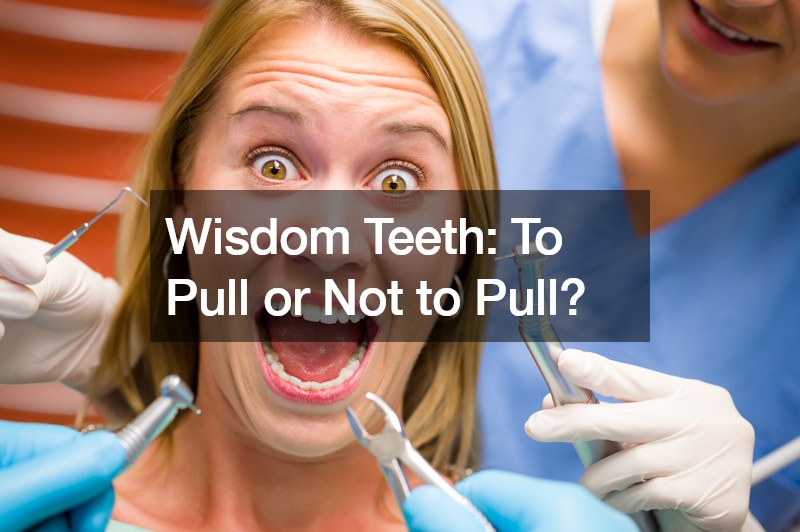

Wisdom teeth, also known as third molars, have been a subject of debate in dental care for decades. These late-blooming teeth often emerge during young adulthood, but their arrival isn’t always met with joy. While some people experience no issues with their wisdom teeth, others face a host of problems, leading to the question: should wisdom teeth be pulled or left alone? Let’s delve into this dilemma and explore the factors influencing this decision.
The Evolutionary Significance of Wisdom Teeth
Understanding the evolutionary role of wisdom teeth sheds light on why they exist and whether they are necessary today. Our ancient ancestors heavily relied on these teeth to chew tough, raw foods like roots and meat.
However, as our diets evolved, the need for these extra molars diminished. Yet, they persist in many individuals, causing complications due to changes in jaw size and dietary habits.
When Extraction is Necessary
There are various scenarios where wisdom teeth extraction becomes imperative. One common issue is impaction, where the tooth fails to erupt fully through the gum line, leading to pain, infection, and potential damage to neighboring teeth. Additionally, wisdom teeth may cause overcrowding or misalignment, disrupting the harmony of your smile and impacting oral health. In such cases, wisdom tooth removal services are often recommended to prevent further complications and maintain optimal dental function.
Furthermore, wisdom teeth may develop cysts or tumors, particularly when they are impacted or only partially erupted. These growths can lead to serious complications, including damage to surrounding bone and tissue. Moreover, infected wisdom teeth can contribute to the development of periodontal disease, a severe gum infection that can result in tooth loss if left untreated. By addressing these issues through extraction, individuals can mitigate the risk of long-term dental problems and preserve their overall oral health.
Assessing Wisdom Teeth Health
On the other hand, not all wisdom teeth require removal. If these molars grow in properly aligned, fully emerged, and without causing discomfort or issues with neighboring teeth, they can be left untouched. Regular dental check-ups are crucial for monitoring wisdom teeth health and identifying any emerging problems early on. X-rays and clinical examinations help dentists determine whether extraction is necessary based on individual circumstances.
Moreover, advancements in dental technology have made it easier for dentists to assess wisdom teeth health accurately. Cone beam computed tomography (CBCT) scans provide detailed 3D images of the teeth and surrounding structures, enabling dentists to identify potential issues such as impaction, cyst formation, or root proximity more precisely. These advanced diagnostic tools empower dentists to make informed decisions about whether extraction is necessary, optimizing patient care and outcomes.
Additionally, open communication between patients and their dental care providers is vital in discussing concerns, understanding treatment options, and ultimately determining the best course of action for managing wisdom teeth health.
The Extraction Process and Aftercare
For those facing wisdom teeth extraction, understanding the procedure and aftercare is essential. Extraction typically involves anesthesia to ensure a pain-free experience. Depending on the tooth’s position, the dentist may need to make an incision in the gum or even remove a portion of the jawbone to access the tooth. After the extraction, proper post-operative care is crucial for a smooth recovery. This includes applying ice packs to reduce swelling, consuming soft foods, avoiding strenuous activities, and following prescribed medications diligently.
In addition, patients should be aware of potential complications that may arise during or after the extraction procedure. While uncommon, risks such as excessive bleeding, infection, or nerve damage can occur. Dentists carefully monitor patients during and after surgery to minimize these risks and address any complications promptly.
It’s essential for patients to adhere to all post-operative instructions provided by their dentist to promote optimal healing and reduce the likelihood of complications. Regular follow-up appointments allow dentists to monitor progress, address any concerns, and ensure that the extraction site heals properly.
Interesting Insights and Considerations
Beyond the practical aspects of wisdom teeth extraction, there are fascinating insights to consider. For instance, did you know that approximately 35% of people are born without wisdom teeth? This genetic variation highlights the diverse nature of human dental anatomy. Moreover, research has revealed that wisdom teeth contain valuable stem cells, offering potential benefits for regenerative medicine. These insights underscore the complexity and significance of these seemingly mundane molars.
Closing Thoughts
In the ongoing debate over wisdom teeth extraction, there’s no one-size-fits-all answer. Each case must be evaluated individually, considering factors such as dental health, alignment, and potential risks. While extraction may be necessary in certain situations to prevent complications and maintain oral well-being, for others, preserving healthy wisdom teeth poses no harm.
Regular dental check-ups and open communication with your dentist are essential for making informed decisions about your oral health. Ultimately, whether to pull or not to pull wisdom teeth is a personal choice guided by professional advice and individual circumstances.
.

